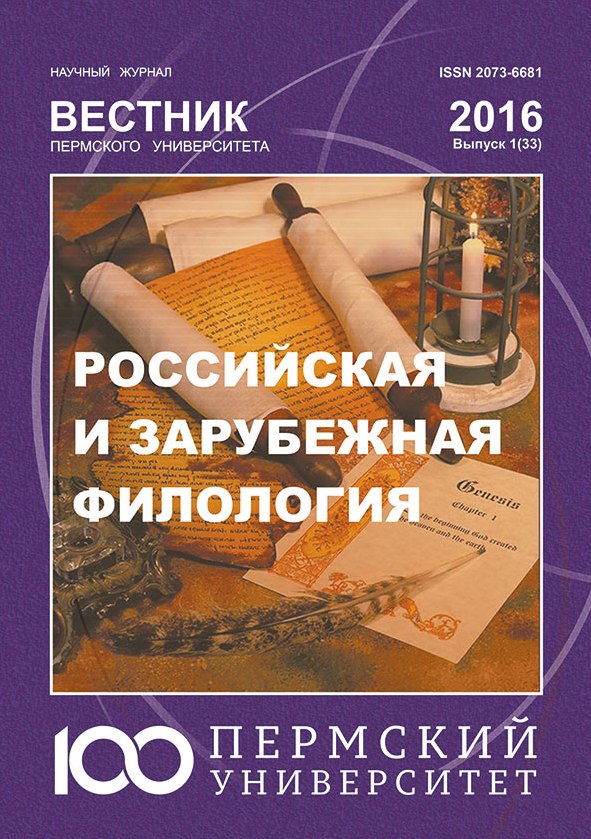REBJATA VS DETI: CORRELATION OF «ADULTS’» AND «CHILDREN’S» REGULATIVE FORMS OF ADDRESS (a case study of the Jozh and Chizh magazines for children, 1928–1941)
Keywords:
speech etiquette, form of address, regulative form of address, semantic changes, children's literature.Abstract
The article considers the regulative form of address rebjata as a characteristic feature of the first half of the 20th century speech etiquette. Based on the material of the Jozh and Chizh magazines for children (1928–1941), it is shown that the speech etiquette used in children's communication was formed on the basis of the opposition “rebjata – deti”. This opposition reflects some social and historical concepts, which extend the denotative meaning of the word rebjata and also the understanding of inclusion/non-inclusion of a child into the Soviet society according to some social parameters. The opposition “rebjata – deti” is identical to the oppositions “tovarishch – gospodin”, “tovarishch – grazhdanin”, found in the adults’ speech etiquette and reflecting some social changes within the new society, including an intention to make a child a competent member of the society.References
Арутюнова Н. Д. Номинация – обращение // Язык и мир человека. М.: Яз. рус. культуры, 1999. С. 115–120.
Балакай А .А. Этикетные обращения: функционально-семантические и лексикографические аспекты: автореф. дисс. … канд. филол. наук. Новокузнецк, 2005. 22 с.
Балакай А. Г. Русский речевой этикет и принципы его лексикографического описания: автореф. дисс. ... докт. филол. наук. Орел, 2002. 40 с.
Велтистова А. В. Обращение в современном английском языке (в сопоставлении с русским): дисс. … канд. филол. наук. Л., 1964, 28 с.
Гольдин В. Е. Обращение: теоретические проблемы. М.: URSS ЛИБРОКОМ, 2009. 127 с.
Дмитриева Л. К. Обращение и вводный компонент. Лекции. Л.: ЛГПИ, 1976. 48 с.
Дохова З. Р. Лингвистический статус обращений (на материале русского и кабардино-черкесского языков): автореф. дисс. … канд. филол. наук. Нальчик, 2007. 21 с.
Минина О. Г. Обращение в современном английском языке. Коммуникативно-прагматический аспект. Белгород, 2000. 15 с.
Проничев В.П. Синтаксис обращения. (На материале рус. и сербохорват. яз.). Л.: Изд-во Ленингр. ун-та, 1971. 88 с.
Путилова Е. О. Очерки по истории критики детской литературы, 1917–1941. М.: Детская лит., 1982. 175 с.
Руднев А. Г. Синтаксис осложненного предложения. М.: Учпедгиз, 1959. 198 с.
Рыжова Л. П. Обращение как компонент коммуникативного акта: автореф. дисс. … канд. филол. наук. М., 1982. 15 с.
Ушаков – Толковый словарь русского языка: в 4 т. / под ред. проф. Д. Н. Ушакова. М.: Гос. ин-т «Советская энциклопедия»; ОГИЗ (т. 1); Гос. изд-во иностр. и нац. словарей (т. 2–4), 1935–1940.
Чуковский К. И. Живой как жизнь: о русском языке. М.: Зебра Е, 2010. 303 с.
Шахматов А. А. Синтаксис русского языка. М.: URSS Изд-во ЛКИ, 2011. 620 с.
References
Arutjunova N. D. Nominatsija – obrashhenie [Nomination as a form of address]. Jazyk i mir cheloveka [Language and a human's world]. Moscow: Jaz. rus. kul'tury Publ., 1999. P. 115–120.
Balakaj A. A. Etiketnye obrashhenyja: funktsional'no-semanticheskie i leksikograficheskie aspekty. Avtoref. dis. kand. fil. nauk [Etiquette forms of address: functional, semantic and lexicographical aspects. Synopsis of Cand. philol. sci. diss.]. Novokuznetsk, 2005. 22 p.
Balakaj A.G. Russkij rechevoj etiket i printsipy ego leksikograficheskogo opisanija. Avtoref. dis. dokt. fil. nauk [Russian speech etiquette and its lexicographical description principles. Synopsis of Dr. sci. diss.]. Orel, 2002. 40 p.
Chukovskij K. I. Zhivoj kak zhizn': o russkom jazyke [Alive like life: about the Russian language]. Moscow: Zebra E Publ., 2010. 303 p.
Dmitrieva L. K. Obrashhenie i vvodnyj komponent. Lektsii [Form of address and a parenthetical component. Lectures]. Leningrad: Leningrad State Pedagogical Institute Publ., 1976. 48 p.
Dokhova Z. R. Lingvisticheskij status obrashhenij (na materiale russkogo i kabardino-cherkesskogo jazykov). Avtoreferat dis. kand. fil. nauk [Linguistic status of forms of address (a case study of the Russian and Kabardino-Cherkess languages). Synopsis of Cand. philol. sci. diss.]. Nalchik, 2007. 21 p.
Gol'din V. E. Obrashhenie: teoreticheskie problemy [Form of address: theoretical issues]. Moscow: URSS LIBROKOM Publ., 2009. 127 p.
Minina O. G. Obrashhenie v sovremennom anglijskom jazyke. Kommunikativno-pragmaticheskij aspect [Form of address in the modern English language. Communicative and pragmatic aspects]. Belgorod, 2000. 15 p.
Pronichev V. P. Sintaksis obrashhenija. (Na materiale rus. i serbohorvatskogo jaz.) [Syntax of form of address. (A case study of Russian and Serbo-Croatian)]. Leningrad: Lenin. St. Univ. Publ., 1971. 88 p.
Putilova E. O. Ocherki po istorii kritiki detskoj literatury, 1917–1941 [Essays on the history of children's literature criticism, 1917–1941]. Moscow: Detskaja literatura Publ., 1982. 175 p.
Rudnev A. G. Sintaksis oslozhnjonnogo predlozhenija [Syntax of a complicated sentence]. Moscow: Uchpedgiz Publ., 1959. 198 p.
Ryzhova L. P. Obrashhenie kak komponent kommunikativnogo akta. Avtoreferat dis. kand. fil. nauk [Form of address as a communicative act element. Synopsis of Cand. philol. sci. diss.]. Moscow, 1982. 15 p.
Shakhmatov A. A. Sintaksis russkogo jazyka [The Russian language syntax]. Moscow: URSS LKI Publ., 2011. 620 p.
Ushakov D.N. Tolkovyj slovar' russkogo jazyka: v 4 t. [The Explanatory Dictionary of the Russian language: in 4 vols.] / ed. by D. N. Ushakov. Moscow: Gosudarstvennyj institut “Sovetskaja entsiklopedija”, OGIZ (vol. 1); Gosudarstvennoe izdatel'stvo inostrannykh i natsional'nykh slovarej Publ. (vols. 2–4), 1935–1940.
Veltistova A. V. Obrashhenie v sovremennom anglijskom jazyke (v sopostavlenii s russkim). Avtoref. dis. kand. fil. nauk [Form of address in the modern English language (compared to the Russian language). Cand. philol. sci. diss.]. Leningrad, 1964. 28 p.




